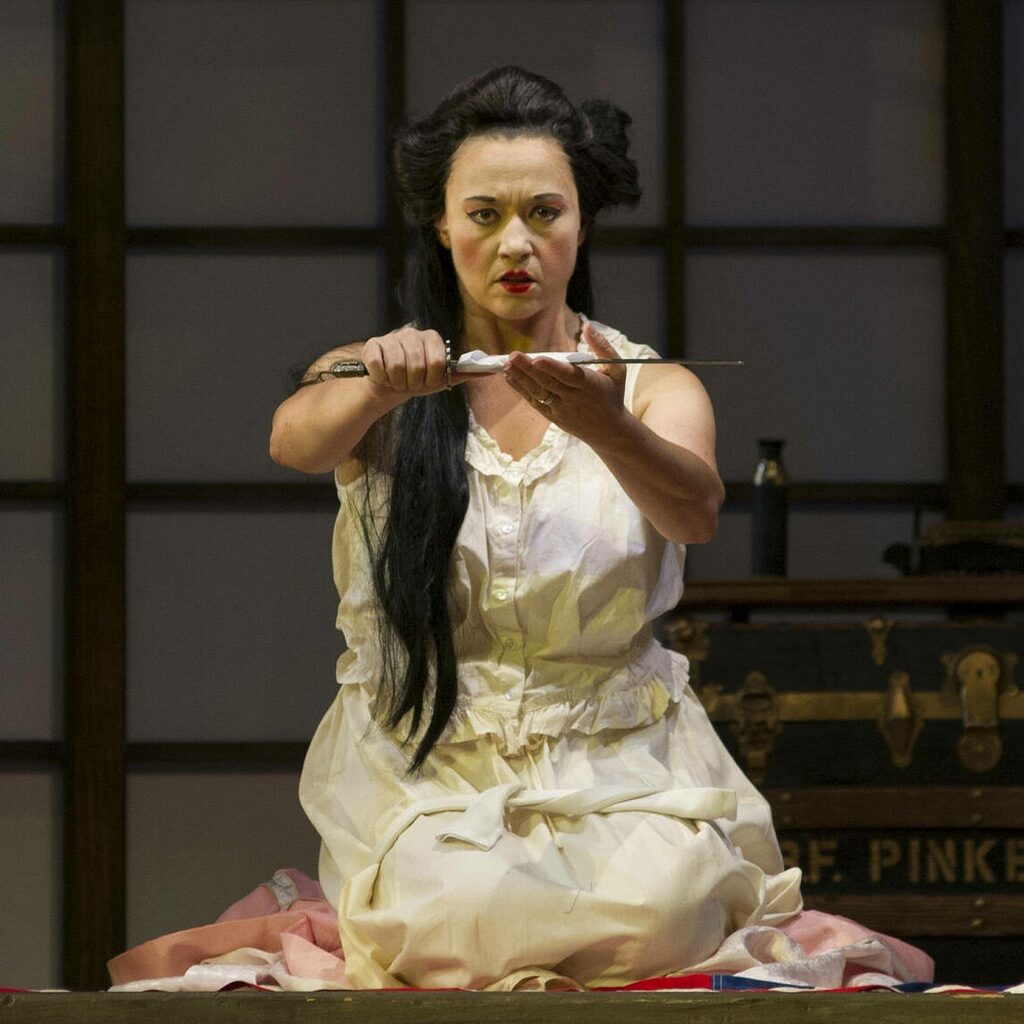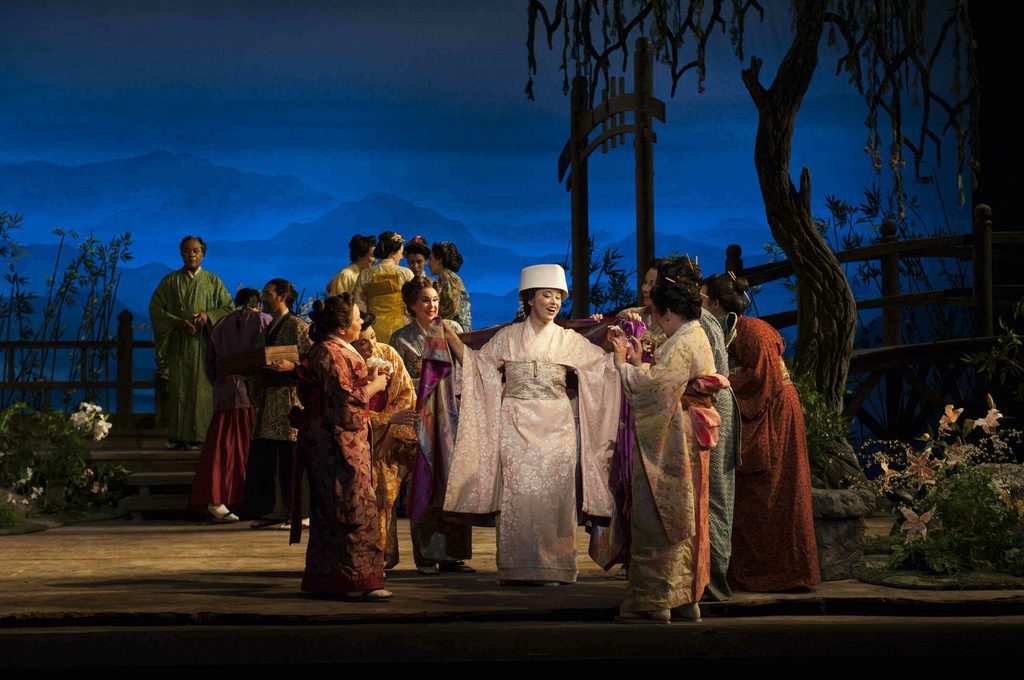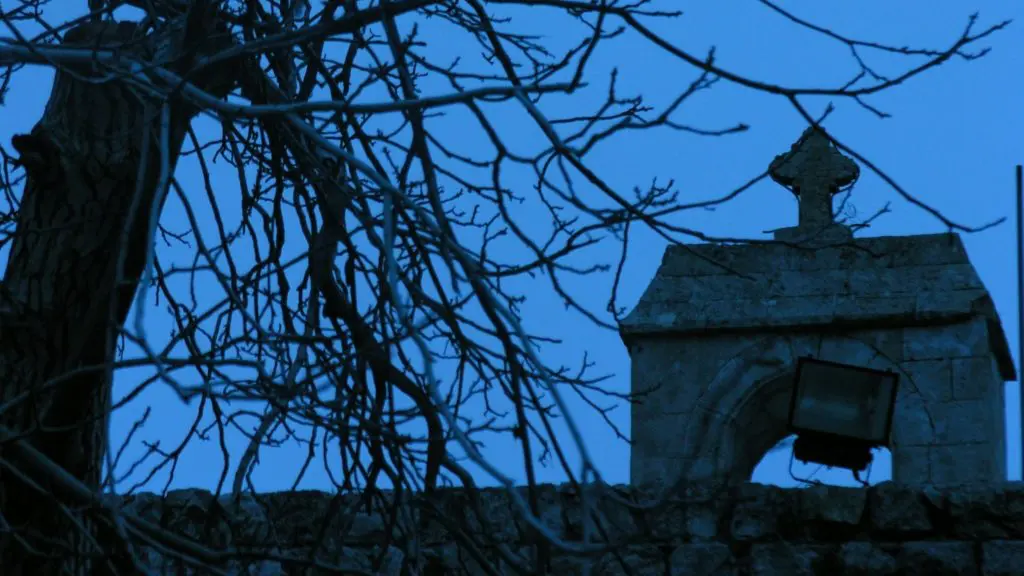Giacomo Puccini’s Madama Butterfly returned to open the Palm Beach Opera’s 2023 season, having been seen here as recently as 2017. A melodrama with gorgeous melodic moments, innocent love, and a stingingly thoughtless betrayal, it also features a remote Japanese setting that earlier twentieth-century audiences understood to be exotic. Adapted from a short story published in 1898 by the American lawyer John Luther Long, who was himself influenced by the French Orientalist writer Pierre Loti’s Madame Chrysanthème, the plot hints at the ugliness of imperialism at a time when Theodore Roosevelt’s ‘Great White Fleet’ was sent around the world on a goodwill tour in fulfillment of his favored African proverb, “Speak softly but carry a big stick.”
An American lieutenant symbolically named Benjamin Franklin Pinkerton—a combination of both a Founding Father and a security-guard service—arrives in Nagasaki (later famous as the second city to be blasted by an atomic bomb) aboard a vessel named after Abraham Lincoln, the president who saved the Union in a war that preceded a significant expansion of American wealth and power. In a flight of fancy, he leases a Japanese house for 999 years with the option to cancel at any time with one month’s notice. He is equally insouciant about his marriage to a local girl, called Cio-Cio-San, whose aristocratic family has been forced down in the world by ugly circumstances including her father’s portentous suicide by harikiri. Only fifteen, she falls for the dashing sailor, even adopting his Christian religion. Her conversion horrifies her family members, who leave the wedding ceremony cursing her name.
Pinkerton marks their wedding by toasting the day when he will wed a “real” American wife, then spends one passionate night with Cio-Cio-San before sailing off for three years. She pines for his return, examining every arriving ship to see if it is his and rejecting wealthy suitors who offer her a better life. When he does return, with American wife Kate in tow, Cio-Cio-San reveals to an intermediary that their wedding night produced a son. The Pinkertons offer to take the child to America, and Cio-Cio-San agrees on the condition that Pinkerton, who is avoiding her, come for him in person. This he does, only to find his first bride dead from the same ritual suicide that claimed her father.
Madama Butterfly notoriously failed at its 1904 premiere, in a version that is almost never revived (Milan’s La Scala presented the original in an artful 2016 production). Puccini’s revision, which enjoyed a better reception a few months later, tightened up the drama and, critically, humanized Pinkerton by giving him a proper tenor aria, ‘Addio, fiorito asil,’ to express regret over his callous behavior.
This is the Butterfly we know and love almost to the point of guilty pleasure. Directed by Alison Moritz, Palm Beach Opera deployed Lloyd Evans’s sets and costumes, which were designed for the New York City Opera before that stalwart company’s demise and rebirth as a lesser endeavor on the fringes of New York’s decaying cultural life. Evans imagined Japan much as it was around 1900, a rapidly modernizing society that still preserved its traditional manners and accoutrements. Butterfly and her family come from the more traditional world, while the marriage-broker Goro, her suitor Prince Yamadori, and other worldlier characters wear Western frock coats, an assimilation of style that should remind us that when Japan’s foreign minister signed the World War II instrument of surrender in 1945, he did so in English morning dress, complete with a silk top hat and white gloves. The American characters look about right: white uniform for Pinkerton, three-piece suit for the consul Sharpless, and a dress for Kate that could have been lifted from the wardrobe department of Meet Me in St. Louis.
Palm Beach Opera’s general and artistic director, David Walker, introduced the opening night performance by noting that the company had engaged a cultural consultant to make the production as respectful as possible of Japanese culture. This has become a necessity on North American stages, where even the perception of cultural insensitivity can lead to career-ending allegations of racism. Verdi’s Otello can no longer appear in dark makeup. Gershwin’s Porgy and Bess is reserved for black performers as a condition of the composer’s will (though this did not stop an all-white Hungarian cast recently from signing declarations that they identified as African-American to meet that condition). Operas on Asian themes are also subject to racialist scrutiny. A New York production of Gilbert and Sullivan’s The Mikado was removed from performance because it featured an all-white cast. The New York Times suggested that the Metropolitan Opera has a “Turandot problem” because the company presented Puccini’s Chinese-themed opera in a fantastical production by the late Franco Zeffirelli. Some have argued that non-Asians should not perform Asian characters, a prospect that would devastate casting if companies took the admonition seriously. For all the widespread wokeness in classical music today, hardly any do.
Here it was hard to determine what, if anything, distinguished the production from any other traditional staging of Madama Butterfly. The program notes discussions with the Morikami Museum and Japanese Gardens in nearby Boca Raton, an outstanding institution that documents early twentieth-century agricultural settlements by Japanese immigrants in Florida. But it does not reveal what features of the opera were addressed. Perhaps the bows were more authentic. Butterfly’s suicide by dagger thrust to the throat, instead of her usual disembowelment, might also have been a change.

In general, however, while some of the score’s japonaiserie was invented, it is fair to say the composer at least tried to perform due diligence. As Puccini was working on the score, he consulted extensively with Japanese sources, recordings, and performers, including the wife of Japan’s ambassador to Italy, who was an expert player of the koto, a kind of zither. Indeed, when the opera premiered in Tokyo in 1914, it was widely celebrated, just as performances of Turandot in Beijing’s Forbidden City nearly a century later were regarded as a great source of national pride for a China emerging to face a global destiny. Japanese objections to Butterfly did not allege any demeaning of the country and its culture, but rather focused on the inaccurate mixing of a noblewoman with the lower-class geisha subculture. A Japanese friend of samurai descent, who has lived in America for decades and is a great connoisseur of opera, refuses to attend performances of Butterfly for that reason, not because she feels it transgresses her woke norms.
Palm Beach has enjoyed a rapid cultural ascent, attracting the money, taste, and talent which have been stifled in less friendly environments. Theaters are full, and, laudably, following the COVID closures, Palm Beach Opera was the first North American company to return to staged performance in February 2021. Last season it received the largest donation in its history. Its annual gala—which this year features the celebrated Polish tenor, Piotr Beczała, in between two new Metropolitan Opera productions in which he is starring—is one of the resort island’s most prestigious social events.
In Jennifer Rowley, another Met singer has found her way onto the local roster, playing Cio-Cio-San. Having appeared last season in The Merry Widow, Rowley’s full, round voice seized the part’s middle notes and could descend to its lows with aplomb. Her high notes, however, were a matter of stretch and strain. A fine dramatic sensibility somewhat compensated for that shortcoming to deliver a more than credible performance. Her Pinkerton, Jonathan Burton, is well remembered from his starring appearances in Bizet’s Carmen last season. A warm, clarion tenor lent a touch of innocence to the tragedy of his character’s actions.
Most of the rest of the cast made their company debuts in this production. Baritone Troy Cook sang weakly as Sharpless, the American consul. Renée Tatum, a Met mezzo-soprano, fared better in the role of Cio-Cio-San’s servant and confidante, Suzuki. Joshua Sanders’s Goro was lively but approached caricature, perhaps surprisingly given the engagement of a cultural consultant to avoid such things. The company’s resident artists filled the smaller roles. Conductor Carlo Montanaro, also in his Palm Beach debut, led a fine performance.






